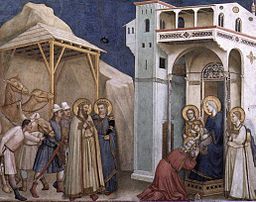Epiphany, the Feast of The Three Kings

Epiphany is celebrated 12 days after Christmas on 6th January (or January 19th for some Orthodox Church who have Christmas on 7th January) and is the time when Christians remember the Wise Men (also sometimes called the Three Kings) who visited Jesus.
Epiphany is also when some Churches remember when Jesus was Baptised, when he was about 30, and started to teach people about God. Epiphany means 'revelation' and both the visit of the Wise Men and his Baptism are important times when Jesus was 'revealed' to be very important.
Some Churches celebrate use Epiphany to celebrate and remember both the visit of the Wise Men and Jesus's Baptism!
Epiphany is mainly celebrated by Catholics and Orthodox Christians. It's a big and important festival in Spain, where it's also known as 'The festival of the three Magic Kings' - 'Fiesta de Los tres Reyes Mages', and is when Spanish and some other Catholic children receive their presents - as they are delivered by the Three Kings!
In Spain on Epiphany morning you might go to the local bakers and buy a special cake/pastry called a 'Roscón' (meaning a ring shaped roll). They are normally filled with cream or chocolate and is decorated with a paper crown. These are normally a figure of a king (if you find that you can wear the crown) and a dried bean (if you find that you're meant to pay for the cake!). In Catalonia it's known as a Tortell or Gâteau des Rois and is stuffed with marzipan.
In France you might eat a 'Galette des Rois', a type of flat almond cake. It has a toy crown cooked inside it and is decorated on top with a gold paper crown.
There are similar traditions in Mexico where Epiphany is known as 'El Dia de los Reyes' (the day of The Three Kings). It's traditional to eat a special cake called 'Rosca de Reyes' (Three Kings Cake). A figure of Baby Jesus is hidden inside the cake. Whoever has the baby Jesus in their piece of cake is the 'Godparent' of Jesus for that year.
In Italy, some children also get their presents on Epiphany. But they believe that an old lady called 'Befana' brings them. Children put stockings up by the fireplace for Befana to fill.
In Austria, at Epiphany, some people write a special sign in chalk over their front door. It's a reminder of the Wise Men that visited the baby Jesus. It's made from the year split in two with initials of the names that are sometimes given to 'the three wise men', Caspar, Melchior and Balthazar, in the middle. So 2014 would be: 20*C*M*B*14. The sign is meant to protect the house for the coming year. Some parts of Germany also have the tradition of marking over doors. The 'Four Hills' Ski Jumping Tournament also finishes on 6th January in Bischofshofen, Austria.
In Ireland, Epiphany is also called 'Nollaig na mBean' or Women's Christmas. Traditionally the women get the day off and men do the housework and cooking! It is becoming more popular and many Irish women now get together on the Sunday nearest Epiphany and have tea and cakes!
In the Ethiopian Orthodox Church (which celebrates Christmas on 7th January), twelve days after Christmas, on 19th January, the three day celebration of Ethiopians Timkat starts. This celebrates Jesus's baptism.
Epiphany Eve (also known as Twelfth Night) marks the end of the traditional Christmas celebrations and is the time when you were meant to take Christmas decorations down - although some people leave them up until Candlemas.





No comments:
Post a Comment